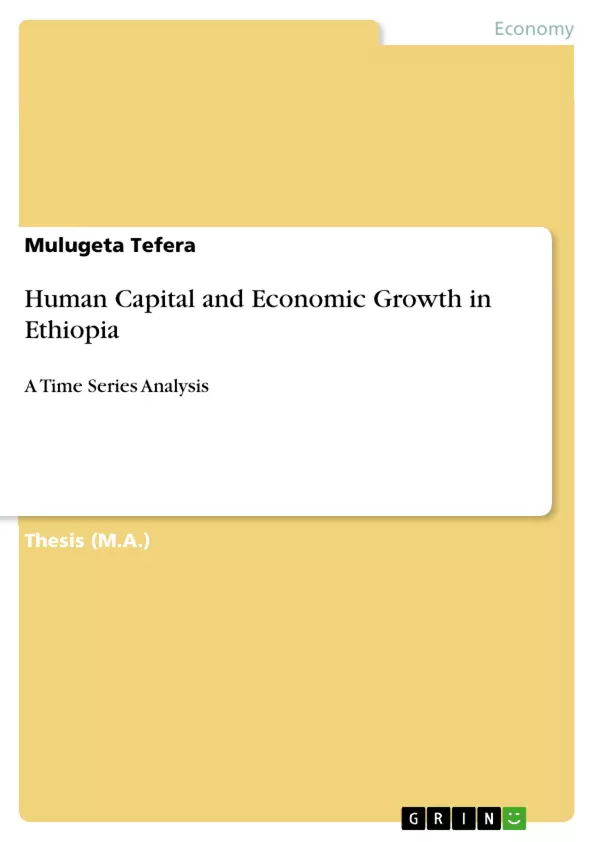The topic of the research is Human Capital and Economic Growth of Ethiopia. The research answered questions such as “does human capital contribute to economic growth of Ethiopia?” with major objective to analyze the short run and long run effect of human capital on economic growth of Ethiopia over 1971 to 2013 using both ordinary least square (OLS) econometric and descriptive methods of data analysis. The data used for the research is secondary time series data collected by the National Bank of Ethiopia over the years 1971 to 2013. Nominal GDP is used as dependent and proxy variable for Economic growth while independent variables are physical capital, active labor force, terms of trade for measure of openness, government expenditure and human capital in the form of expenditure on health and education. Accordingly, the empirical finding shows that human capital in the form of education and health investment has consistent and significant long run effect on economic growth of Ethiopia at 5% level of significance. Keeping the other variables constant, 1% change (increase/decrease) in expenditure in human capital will change (increase/decrease) nominal output by 0.23%. In contrary short run human capital has consistent but insignificant effect on economic growth of Ethiopia. Because, either it takes time for education investment to pay off or the government’s budget for short run education and health sector development is not sufficient. The adjustment of the short run dynamics or disequilibrium to the long run equilibrium is weak, which is 36%. Thus, education and sectors ought to allocate resources for both quality of and access so that the benefit from human capital development outshines in contribution to economic growth. The sectoral contribution of human capital to Ethiopian economic growth may be future research.
Inhaltsverzeichnis (Table of Contents)
- Chapter 1
- Introduction
- Background of the study
- Statement of the Problem
- Literature review
- Conceptual framework
- Methodology
- Data sources and methods
- Model specification
- Empirical findings
- Introduction
- Chapter 2
- Background of the study
- Economic growth in Ethiopia
- Human Capital in Ethiopia
- Human Capital and Economic Growth
- Literature review
- Conceptual framework
- Methodology
- Chapter 3
- Data sources and methods
- Model specification
- Empirical findings
Zielsetzung und Themenschwerpunkte (Objectives and Key Themes)
The research aims to analyze the impact of human capital on economic growth in Ethiopia. It investigates both the short-term and long-term effects of human capital on economic growth in Ethiopia from 1971 to 2013 using econometric models and descriptive data analysis. The research uses secondary time series data collected by the National Bank of Ethiopia.
- The contribution of human capital to economic growth in Ethiopia
- The short-term and long-term effects of human capital on economic growth
- The impact of education and health investment on economic growth
- The challenges and opportunities for human capital development in Ethiopia
- The role of government policy in promoting human capital formation
Zusammenfassung der Kapitel (Chapter Summaries)
Chapter 1: Introduction
This chapter introduces the concept of human capital and its importance for economic growth. It provides a background on human capital development in Ethiopia, highlighting the challenges and opportunities. The chapter also outlines the research problem, objectives, and the methodology used in the study.
Chapter 2: Literature review
This chapter reviews existing literature on human capital and its relationship to economic growth. It explores various theoretical perspectives and empirical studies on the topic. The chapter also examines specific cases of human capital development in Ethiopia and its impact on economic growth.
Chapter 3: Methodology
This chapter describes the data sources and methods used in the study. It explains the econometric models used to analyze the relationship between human capital and economic growth. The chapter also discusses the specific variables included in the models and the rationale for their selection.
Schlüsselwörter (Keywords)
The primary focus of the research is on the relationship between human capital and economic growth in Ethiopia. Key terms and concepts explored in the study include human capital formation, economic growth, education, health, investment, econometric models, time series data, ordinary least square method, error correction model, and government policy.
- Quote paper
- Mulugeta Tefera (Author), 2014, Human Capital and Economic Growth in Ethiopia, Munich, GRIN Verlag, https://www.grin.com/document/295755



